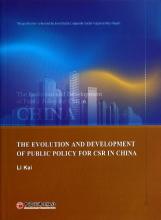摘要:亚太地区的许多国家被视为经济发展迅速的新兴市场,然而他们也面对着如何解决贫穷,提升国民健康,生活水平等挑战。,作者分析在全球经济一体化日益发展下企业社会责任和国家的发展的深刻关系。

Many of the countries in the Asia-Pacific region might be seen as emerging markets with rapid growth rates. Yet many countries and regions of others are still very much developing and subject to many of the challenges of development, including tackling poverty, improving human health and raising standards of living. In the context of globalization, there is little doubt that one of the major alleviators of poverty has been the private sector that has brought much needed investment and jobs into the Asia-Pacific region. Large transnational corporations often bring with them strong CSR policies and practices and this article examines what CSR can bring to development.
As the CSR agenda has gathered momentum so too has the debate surrounding how the private sector can further contribute to development, but there are also those questioning the extent to which CSR is wholly consistent with some aspects of development. Where transnational corporations can partner with the public sector and with NGOs and other civil society organizations, then there is great potential for improving development. But if business in the Asia-Pacific region is more linked to driving down wages and the prices paid for products and raw materials, then the potential for development can be much more limited.
Many development experts, whist supportive of good CSR practices in protecting the interests of workers, local communities and the environment, are nevertheless concerned that some key development issues are still often ignored by the business sector. These issues include poverty reduction, social exclusion of minority groups, tax avoidance, transfer pricing, corporate influence in politics, as well as the limited capacity that local small and medium sized enterprises have in raising their own standards and competing effectively with the large transnational corporations.
What CSR fails to do, according to its critics, is to build a broader-based coalition that includes development agencies, governments, trade unions and other civil society actors. It is also important to recognize that some argue that CSR has been complicit in crowding out debates over the role of regulation and has covered over the major deficiencies in the Asia-Pacific region in effectively implementing what regulations are in place. The focus of CSR and policies adopted by companies wishing to implement good practice in this respect are essentially dependant on the institutional and political contexts in which companies operate. Critics often say that these contexts may not be fully consistent with the needs of developing countries and that large companies are complicit with a rather negligent approach to development needs.It must be pointed out, of course, that advocates of CSR (including myself) have never suggested that CSR is a panacea for development. Nevertheless, there is a potential to build partnerships with businesses in order to do contribute to development. Moreover, whilst it is true that CSR and good corporate governance have an important role to play, it is not the role of businesses alone to create the economic environment in which development can be achieved. Nevertheless, it is clear that the number of companies involved in good CSR practices and associated voluntary agreements, still needs to be scaled up. It is also the case that many businesses are fully aware of the limitations of self-regulation and do themselves often favour clearer regulations and better implementation of those regulations in order to create a more level playing field. Indeed, good practices with respect to CSR should begin with ensuring that laws are obeyed even if implementation is poor. Companies adopting good CSR will avoid a ‘race to the bottom’ that only considers the price paid for goods and services with little consideration of labour standards, freedom of association and community development. The incentive not to comply often outweighs the incentive to comply in an environment of regulatory failure and large businesses need to contribute to initiatives that prevent supply chains benefiting from such negative effects.
One of the ways to deal with these sorts of problems is to move CSR from a top-down audit and inspection approach where the company acts as policeman and towards a bottom-up approach where there is the greater involvement of NGOs, more attention given to workers’ empowerment and more interaction with local communities. This is certainly the direction in which many CSR leaders want to progress, but they themselves are often faced with a lack of capacity in the countries where they do business to help them in this respect.Dealing with CSR laggards is also a challenge for advocates of CSR. There is no doubt that whilst many large brands are investing considerably in good CSR practices, for some, CSR can be a function of PR and marketing hype. In such cases, critics have accused CSR as a way of ‘decorating’ neoliberalism, rather than and effective way of operationalising sustainable development. Some companies have actually been quite resistant to CSR agendas and have wrongly stressed the role of the market mechanism in dealing with such issues. Such approaches mirror the views of Milton Friedman in claiming that the only socially responsible approach for business is to maximize profits.However, let us go back to the issue of how good CSR practices can begin to engage even more effectively in development issues. The important point to realize here is that the sorts of projects being considered and advocated by CSR leaders in business and elsewhere are indeed consistent with the development agenda. Development experts cite the need to go beyond the question of labour standards in achieving poverty reduction and sustainable development. This is exactly what many of us advocate when we talk of the need for better worker and community empowerment and a broader consideration of fundamental human rights and social and environmental justice.Poverty reduction is both an objective for development but can also be an aspiration for CSR. Working with farmers in creating cooperatives, empowering women, developing community capacity, stimulating (and funding) entrepreneurship activities, improving local environmental conditions, creating jobs, initiating public health programmes and engaging with the human rights agenda all consistent with poverty reduction. However, poverty reduction needs to be addressed at the macro-level as well as the micro-level and the involvement of the private sector should not be seen as an opportunity for governments and inter-governmental organizations to opt out of their own responsibilities.
CSR is often seen as being defined by a Western agenda and this may be true. Many of the motives for good CSR practices come from risk reduction concerns and the powerful agendas of the Western media, Western NGOs and consumer movements. It is important that stakeholders in developing countries in the Asia-Pacific region are also taken into account and one of the challenges for CSR is to better engage at a local level. Many have tried to do this but report a lack of sophistication, confidence and communications skills on the part of people and organizations they wish to engage with. In some locations, there is actually a fear on the part of people in making their views known and distrust of the real motivations of the private sector. Once again, we come back to the need for capacity building and empowerment before effective local stakeholder dialogue becomes more mature, but we also need to ensure that the CSR motivations of businesses are also believed.In order to address the future priorities for CSR, it is important to face up to areas where CSR still has much to achieve. The vast majority of CSR initiatives in the Asia-Pacific region focus on the first tier of suppliers and it is likely that many of the worst labour, OHS and environmental practices occur further down supply chains. Moreover, it is often in the primary industries, including mining, agriculture, forestry and fishing where the abuse of people and the environment is most prevalent. It must also be recognized that much of the working population in developing countries is in the informal sector (including home working) and this has not been fully taken on board. To deal with extended supply chains and the large informal sector in developing countries, there is a need for CSR activities to extend their focus. There may be a need to contribute to the institutions and structures that can both extend the scope of CSR and at the same time protect and enhance the benefits for these more marginalized workers. For example, current union structures cannot address the needs of women workers, working in their own homes, who might be better organized at a community level than in the workforce. Companies can make a contribution to creating new and innovative solutions, but again, there is first the need to create capacity on the ground, which is missing in many developing countries.Another challenge for advocates of CSR is unemployment and underemployment. Whist the CSR movement is keen to improve formal labour standards and labour rights associated with freedom of association and collective bargaining, it must also recognize that enforcing higher labour standards in a situation of mass unemployment could serve to reduce employment.If CSR is to make a contribution to the process of development then, of course, it has to be done in partnership with others. The private sector alone cannot create the sustainable development that is much needed in this region. But, one of the most successful partnerships that remains underdeveloped involves business to business partnerships within the same sector. Increasingly, moving beyond the first tier of the supply chain is going to need a concerted effort by groups of companies working together rather than working alone.A more sectoral focus, rather than a company-specific focus can enhance cooperation through multi-stakeholder initiatives and could do more to develop actual work programmes and capacity building rather than endless debates at an institutional level. Moreover, joint programmes are more capable of moving from the auditing and inspection agenda towards a more rights-based agenda that is more capable of dealing with the concerns of the development community.I would argue that CSR has made a contribution to development and that the private sector has made a huge contribution to poverty alleviation through its investments. Nevertheless, there is still much more to do if CSR is to make a contribution to the further development of the Asia-Pacific region. The key is to identify the role of business within the context of national and international politics, societal norms and development programmes. CSR is highly dependent on the institutional and regulatory context of the region where it is being adopted. Moreover, governments have to be part of a process of ensuring that good CSR practices become the norm and are made consistent with its own policies on labour standards, human rights and the environment.Common to both CSR and development is the need for much improved participation of stakeholders from developing countries. Both agendas need to be shaped to meet the needs of the people and this often means a switch from a top-down to a bottom-up model. We need to move from the codes of conduct based, inspection approach in the workplace, for example, to a model of participatory workplace appraisal. But such an approach can also be mirrored at a community level as well. Certainly, such an approach is consistent with real democratization and empowerment of the people affected by a lack of development.Development is however, not only a local and national issue. It also has to be an international issue and one connected with the ongoing process of globlalisation. It is the process of globalization that has the potential to put more emphasis on development issues and in this respect the large transnational corporations that dominate the globalization process have an even greater role to play. The role of local regulation is important, but so too therefore is the role of international initiatives such as the Global Compact, the ILO Tri-Partite Declaration of Principles Concerning Multinational Enterprises and Social Policy, OECD Guidelines for Multinational Enterprises and the UN Norms on the Responsibilities of Transnational Corporations and Other Business Operations with Regard to Human Rights. Such initiatives should increasingly be part of CSR agendas and practices. There may even be a role for even more binding international regulations on accountability, governance and business conduct.CSR has to be seen as part of a process of developing countries and tackling poverty. Although this article has pointed to some limitations of CSR and some challenges ahead, it remains the private sector that has the most potential, through investment, trade, entrepreneurship and empowerment to begin to tackle the challenge of sustainable development. The more that companies engage with these issues, the more we will be able to achieve. 爱华网
爱华网



